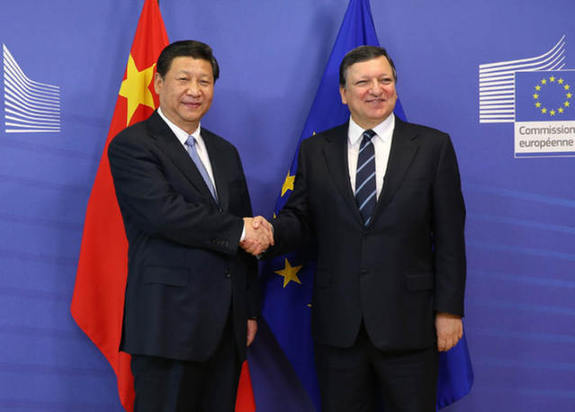By WU JIANMIN
A Call for Peace
Chinese President Xi Jinping attended the 3rd Nuclear Security Summit (NSS) and visited the Netherlands, France, Germany and Belgium, including the UNESCO and EU headquarters from March 22 to April 1. A momentous diplomatic event, the president’s trip to Europe attracted world attention, yielding welcome results. History will prove this to be a milestone in China-EU relations, and its value in boosting the bilateral ties.
|
 |
| Chinese President Xi Jinping meets with European Commission President José Manuel Durão Barroso on March 31, 2014. |
I visited the UK, France and Belgium before and during President Xi’s trip. I also heard his speech at the College of Europe on April 1. Through my talks with Europeans from different walks of life, I realize that the significance of this trip lies not only in China-EU ties, but also in maintaining world peace and stability.
Since the end of last year, there has been a rising tendency to compare current realities with other points in history. Mainstream Western media have published one article after another suggesting that the prevailing global situation resembles that of the year 1914. England and Germany had a strong trading relationship before 1914, from which both sides had greatly benefited. In his 1910 book The Great Illusion, English writer Norman Angell argued that war between European countries was senseless due to the strong economic interdependence among them. Being ravaged by war was the last thing European countries wanted. Yet, in the end, WWI still broke out in 1914 – the most tragic and destructive war to date. Therefore, this comparison of 2014 with 1914 implies likelihood of a great war.
In the meantime, world media also hyperbolize about tensions in East Asia. Undoubtedly disputes have arisen around the Diaoyu Islands between China and Japan; it is a situation that China is loath to see. On December 20, 2013, during talks with Japan’s Foreign Minister Fumio Kishida, Cheng Yonghua, China’s Ambassador to Japan pointed out that given the importance of bilateral relations China and Japan would strive to bring ties back to a normal trajectory of a mutually beneficial relationship based on common strategic interests. Kishida said the two sides exchanged views and reached consensus in considering the resolution of disputes through dialogue. Kishida also described the atmosphere during the talks as “friendly.” It had been expected that the talks could thaw frosty ties and normalize relations. Though Japanese Prime Minister Shinzo Abe was aware of this, on December 26, 2013, in defiance of world opinion, he visited Yasukuni – a shrine that glorifies not just soldiers but also 14 Class-A WWII criminals. Obviously, Abe does not favor improvement of Japan-China relations, but instead, out of political compulsions, has intent to sour the bilateral relationship.
Abe stated at the World Economic Forum in Davos on January 22, 2014, that current relations between Japan and China could be compared to those between England and Germany in 1914 before WWI. His remarks drew much comment from the international community, some even remarking that Northeast Asia today is the most dangerous place in the world.
In addition, this year marks the 120th anniversary of the first Sino-Japanese War in 1894, known in China as the Jiawu War. A trend comparing 2014 with the year 1894 has emerged in China. Some magazines have even published cover stories themed on the assumption that the two countries would revive the Jiawu War. So-called experts have been invited to discuss on TV the probability of a war, analyzing advantages and disadvantages of the two countries in terms of military strength.
